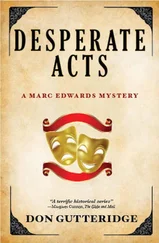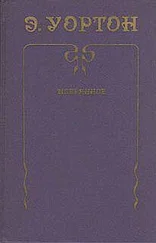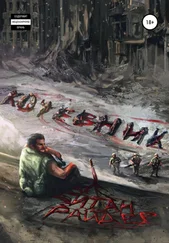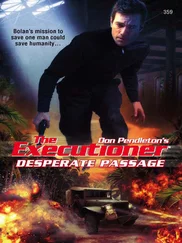Итан Рарик - Desperate Passage
Здесь есть возможность читать онлайн «Итан Рарик - Desperate Passage» весь текст электронной книги совершенно бесплатно (целиком полную версию без сокращений). В некоторых случаях можно слушать аудио, скачать через торрент в формате fb2 и присутствует краткое содержание. Жанр: Путешествия и география, на английском языке. Описание произведения, (предисловие) а так же отзывы посетителей доступны на портале библиотеки ЛибКат.
- Название:Desperate Passage
- Автор:
- Жанр:
- Год:неизвестен
- ISBN:нет данных
- Рейтинг книги:4 / 5. Голосов: 1
-
Избранное:Добавить в избранное
- Отзывы:
-
Ваша оценка:
- 80
- 1
- 2
- 3
- 4
- 5
Desperate Passage: краткое содержание, описание и аннотация
Предлагаем к чтению аннотацию, описание, краткое содержание или предисловие (зависит от того, что написал сам автор книги «Desperate Passage»). Если вы не нашли необходимую информацию о книге — напишите в комментариях, мы постараемся отыскать её.
Desperate Passage — читать онлайн бесплатно полную книгу (весь текст) целиком
Ниже представлен текст книги, разбитый по страницам. Система сохранения места последней прочитанной страницы, позволяет с удобством читать онлайн бесплатно книгу «Desperate Passage», без необходимости каждый раз заново искать на чём Вы остановились. Поставьте закладку, и сможете в любой момент перейти на страницу, на которой закончили чтение.
Интервал:
Закладка:
Edward shrieked at the sight and began begging his parents to prohibit the operation. It was no easy decision. If the leg didn't set properly—and what were the odds of that in a jouncing wagon?—gangrene could fester. The boy could die. But Edward was adamant, and in time his parents agreed. They gave the would-be surgeon five dollars for his trouble and sent him on his way. Edward exhaled and tried to lie easy.
CHARLES STANTON BASKED IN THE SUMMER SUN, letting it warm both his body and his spirit. Snow-capped mountains glittered in the distance, yet another sign that the emigrants had long since left behind the flat-lands of their midwestern homes. Taking up a letter he had written to his brother two weeks earlier, Stanton added a short, optimistic postscript. "We take a new rout to California, never travelled before this season; consequently our route is over a new and interesting region." Perhaps too new and interesting. It was August 3, three days since the Donner Party had pulled away from Fort Bridger, and yet Lansford Hastings remained a ghost.
Then, on the sixth day out from the fort, they found some shadow of the phantom. Someone spotted a note protruding from the top of a sagebrush and called out to tell the others, and when they reached it they found it was from Hastings. In a way, it was a remarkable find—the paper could have blown away or been taken by an animal or simply overlooked—but in fact it was a common method of trailside communication. Paper being valuable, emigrants occasionally used whatever lay at hand for their impromptu billboards—pieces of wood or even buffalo skulls.
The wagons had reached Weber Canyon at the base of the Wasatch Mountains, the steep and rugged range that lay between Fort Bridger and the Great Salt Lake. Up ahead, the forward group led by Hastings—the Harlan-Young Party—had already spent a grueling week struggling down the forbidding canyon, which grew narrower as it went. Wagons crossed and recrossed the river, sometimes driving straight down the rocky bed, with no guarantee they might not topple. One man watched some of his comrades trying to build a road through the canyon and proclaimed in his journal that it was "an exhibition of most consumate folly."
Hastings had never intended to travel down the canyon; a guide working for him had taken the wagons down that route while Hastings was briefly away. Now, in the note he left for the Donner Party, Hastings urged the trailing emigrants to stop where they were and send a messenger ahead so that he could return and take them along another route through the Wasatch. Finding the note, the men of the Donner Party huddled together and decided that three riders would search out Hastings while the rest of the party waited and rested. Ever at the center of events—and at least partly responsible for convincing the others to chance the shortcut—James Reed was chosen to go, along with Charles Stanton and William Pike, a son-in-law in the big Murphy clan. They mounted up, waved goodbye to their families and comrades, and rode off into the mountains to pursue the vanishing "guide" on whom they had staked so much.
THE THREE MEN RODE HARD, but by the time they caught Hastings they had crossed the Wasatch and descended to the beginning of the pancake-flat country that nuzzles up against the Great Salt Lake. None of the three had ever met Hastings, but somewhere in camp they were introduced. Reed must have noted acidly that his party relied on Hastings's promise to guide them from Fort Bridger, only to arrive and find that he had already left. Now they were here to collect on the promissory note. Hastings should return and show the way.
Hastings agreed, and he and Reed headed back toward the Wasatch, Reed on a fresh, borrowed mount. Stanton and Pike, their horses gasping for water and rest, stayed behind, promising to follow along when they could.
Reed and Hastings had not even reentered the Wasatch before Hastings yet again broke his word, announcing that he would not return to the stranded wagons and instead would simply point out the preferred route to Reed. There was no time to go all the way back, Hastings insisted. He needed to stay with the Harlan-Young Party and guide them across the salt desert west of the lake. Reed and Hastings camped together that night, and the next morning climbed a nearby peak from which Hastings vaguely indicated a course the Donner Party wagons might take through the mountains. "He gave me the direction," Reed wrote later.
Then, his duty grossly unfinished, Hastings turned away from Reed and rode off to the west. For the rest of their journey, the members of the Donner Party would never again speak with the man who had promised to lead them.
Consigned to his own ingenuity, Reed rode down off the mountaintop and found an Indian trail, which he began following back toward the wagons, blazing trees to mark the path more clearly. He rode back into the ring of the Donner Party corral on Monday evening, August 10, four days after he, Stanton, and Pike had gone ahead to find Hastings. Eveiyone must have crowded around eagerly to hear his report, in which he told of Hastings's refusal to come back and act as guide. The canyon route of the Harlan-Young Party was too risky, he insisted. Many of the wagons would be destroyed. On the other hand, the path he had just blazed through the Wasatch was "fair, but would take considerable labor in clearing and digging."
There is no record that Reed and the others discussed another option, one they should at least have considered: backtracking to Fort Bridger, returning to the traditional trail, and forsaking Hastings's chimerical cut-off altogether. Traveling from Fort Bridger to their current position had required six and a half days, but since they now knew the country the return trip would have been quicker. And they now had abundant evidence of Hastings's rash judgment, if not mendacity. Clyman had told them the shortcut was probably impassable. Hastings had promised to wait for them at Fort Bridger, then gone ahead without them. Then he had promised to return and guide them through the Wasatch, only to abandon them with little more than a wave of his hand toward a route he had never taken. Surely they did not want to be seen as fainthearts who lost courage in a crisis, staggering back into Fort Bridger ignominiously. But on the other hand, their circumstances had changed—they no longer had any promise of a guide to show them the way—and when fresh evidence emerges settled decisions must often be revisited. Judicious reappraisals were common on western trails. The same year as the Donner Party, one group of emigrants took the so-called Applegate Cut-Off toward Oregon, a new and reputedly easier route. But just fifteen miles past the fork, they found a handwritten note warning that it was two or three days to grass and water, a dangerous and difficult haul. Consultations were held, and the group resolved to change its destination and make for California.
For the Donner Party, backtracking would have cost precious time, but their only other options were equally grim: try to follow the Harlan-Young Party's disastrous route through Weber Canyon, or take their chances with Reed's newfound path, which had never been traversed by wagons of any kind, which in fact barely existed at all. Still, Reed "reported in favour" of the new route, as he put it in his diary, and no one was in a position to argue. Of those who were present, only he had seen the narrow end of Weber
Canyon, and only he had crossed the Wasatch. If he thought the mountain route was the better way—and it may have been—it was simple logic to bow to his judgment. Reed seemed to acknowledge that he bore some special responsibility for the decision. In his journal, he noted that his account of the mountains "induced the Compay to proceed."
Читать дальшеИнтервал:
Закладка:
Похожие книги на «Desperate Passage»
Представляем Вашему вниманию похожие книги на «Desperate Passage» списком для выбора. Мы отобрали схожую по названию и смыслу литературу в надежде предоставить читателям больше вариантов отыскать новые, интересные, ещё непрочитанные произведения.
Обсуждение, отзывы о книге «Desperate Passage» и просто собственные мнения читателей. Оставьте ваши комментарии, напишите, что Вы думаете о произведении, его смысле или главных героях. Укажите что конкретно понравилось, а что нет, и почему Вы так считаете.












